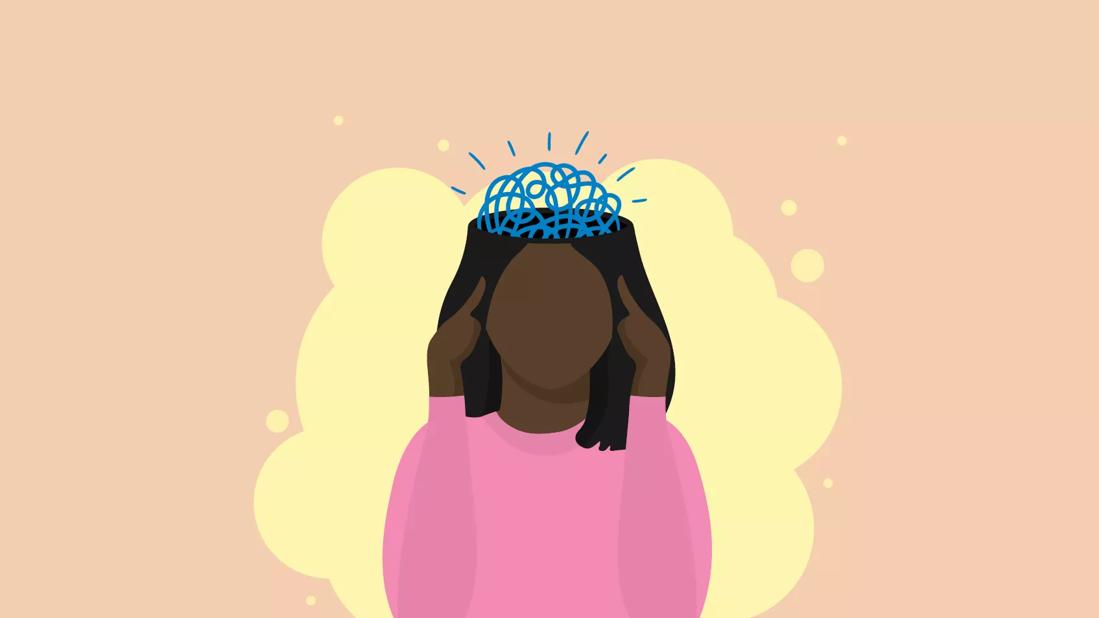Caught in a thinking loop? Here’s how you can change your thought process

Image content: This image is available to view online.
View image online (https://assets.clevelandclinic.org/transform/4715d6d1-3a21-4351-a525-18337ba29c88/Overthinking-1066947770-770x533-1_jpg)
An illustration of a person overthinking
Do your thoughts keep you up at night? Do you second-guess every decision you make? Do you imagine worst-case scenarios?
Advertisement
Cleveland Clinic is a non-profit academic medical center. Advertising on our site helps support our mission. We do not endorse non-Cleveland Clinic products or services. Policy
If so, you might be an overthinker.
While you may believe that continuing to think and rethink about things that bother you is problem-solving, this habit of overthinking doesn’t usually provide any resolution.
In fact, overthinking creates more stress by focusing on the negative, dwelling on the past and worrying about your future.
Registered psychotherapist Natacha Duke, RP, talks about whether overthinking is a mental illness and steps you can take to stop overthinking.
No, overthinking isn’t a recognized mental health condition, but it can be a symptom of depression or anxiety.
Overthinking is commonly associated with generalized anxiety disorder (GAD), says Duke. GAD is characterized by the tendency to worry excessively about several things.
“Someone can develop GAD due to their genes. Or it could be personality factors like the inability to tolerate uncertainty in life. And it could be life experiences,” says Duke. “Normally, it’s a combination of all three.”
Those with GAD may experience:
Physical symptoms of GAD can include restlessness, difficulty concentrating and sleep problems.
Advertisement
If you tend to overthink, you might experience the following:
“What happens is a chain effect,” explains Duke. “You’ll start worrying about one thing, and then you’ll be worried about something completely different. You might start worrying about work and then you’ll start worrying about money. And that leads to worrying about losing your job.”
Problem-solving is a great skill to have and can be very productive. It can be easy to believe that all of your worrying and overthinking is actually problem-solving. But there’s a key difference.
“When a problem presents itself, brainstorming possible solutions is a positive coping strategy,” says Duke. “With overthinking, what happens is that you ruminate, which is where you go over and over a problem again and again. But there’s no real resolution. You get caught up in the thinking loop and you end up where you started. In some cases, you may even end up with more worry and anxiety.”
You want to focus on problem-solving, what is within your control and practice letting the rest go. Whether you spend 20 minutes or two hours ruminating on a problem, it won’t provide the relief and satisfaction you hope for. So, do your best to recognize when you’re overthinking and distract yourself until you’re ready to tackle the problem in a helpful way.
If you notice yourself overthinking, there are steps you can take to limit your worrying and cope in a healthier way, says Duke.
If you struggle to turn off your thoughts at night or your overthinking is interfering with or affecting your daily life, talking to your doctor or a therapist can help.
“The most effective treatment is cognitive behavioral therapy,” says Duke. Your therapist will work with you to challenge your negative thoughts and develop coping skills that can help alleviate your worrying.
Duke also says that positive coping strategies like meditation, reading or writing down your worries can help lessen your anxiety.
It’s also important to make sure you have adequate social support and that you’re resisting the urge to keep things inside. And don’t forget about engaging in healthy habits like eating a well-balanced diet and exercising.
“Pay attention to how much caffeine or alcohol you consume, as these can increase anxiety,” cautions Duke. “Also, try to avoid having too little or too much downtime and engaging in a lot of social media or news consumption, as these things are also going to feed anxiety.”
Advertisement

Sign up for our Health Essentials emails for expert guidance on nutrition, fitness, sleep, skin care and more.
Learn more about our editorial process.
Advertisement
Burnout is often driven by long periods of stress without time to recover — but practicing self-care and creating work/life boundaries can help
If you’re torn between contradictory beliefs, questioning your decisions or feeling ashamed about your choices, you may be experiencing cognitive dissonance
This theory of human motivation says people seek to meet their needs in a predictable order
This trendy practice may boost your physical and mental health — but done incorrectly, it could make things worse
Only some people experience autonomous sensory meridian responses, but it can be beneficial to those who do
You can address negative thinking by reframing the situation, asking for help when you’re stuck and giving yourself some grace
The power of positive thinking can influence your physical, mental and emotional health
Speaking, thinking or writing these affirming statements can help boost confidence, reduce anxiety and overcome self-doubt
Prioritize your health by managing stress, strengthening your social connections and getting quality sleep
Bolsters, blankets, pillows and blocks can offer extra support, stability and comfort
Allergies, postnasal drip, asthma or reflux could be to blame for a cough that won’t quit